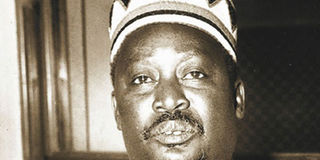How powerful forces brought down Jaramogi

Jaramogi Oginga Odinga. During the Limuru conference in 1966, his position of Kanu deputy party leader was abolished. PHOTO | FILE | NATION MEDIA GROUP
What you need to know:
- Jaramogi wasn’t an ideological Communist despite being labelled so. His capitalist business interests which he retained and continued to expand were enough evidence.
- Jaramogi said he turned to communist governments for money to further his political aims after the Americans and the British opted to sponsor his rival Mboya.
By 1965, Vice President Jaramogi Oginga Odinga, whose 25th anniversary was celebrated last week, was already an isolated man, as a conflict of ideologies and personal ambitions became the biggest threat to the new republic’s unity.
Lending credence to this, according to previously confidential documents reviewed by the Sunday Nation, was a secret meeting between Attorney General Charles Njonjo and British Secretary of State Lord Arthur Bottomley in London on June 11, 1965 at 10am.
Njonjo, who for a long time had great influence on Kenya’s foreign policy, informed the British official that every step had been taken to isolate Jaramogi.
The vice president was considered “dangerous” because of his Communist connections with Russia and China.
Njonjo pointed out that unlike before when Jaramogi had unfettered access to President Jomo Kenyatta, he could now only see him by appointment.
TOM MBOYA
Even though Tom Mboya was the chief political tactician of the so-called Kanu “moderates” in their assault on Jaramogi, the conversation in London also reveals how much he was also resented by some influential individuals.
Njonjo revealed that Mboya was ambitious and that Mzee Kenyatta didn’t like his "frequent leakages to the press".
But by any standards Jaramogi wasn’t an ideological Communist despite being labelled so. His capitalist business interests which he retained and continued to expand were enough evidence.
CAPITALIST
In one documented conversation between Jaramogi and British High Commissioner to Kenya Sir Malcolm MacDonald, Jaramogi said he turned to communist governments for money to further his political aims after the Americans and the British opted to sponsor his rival Mboya.
“Again, with characteristic frankness, he has said to me privately on more than one occasion that if the communist powers had been his rival’s supporters, he would gladly have opposed them, and supported the Americans, the British or anyone else who came to his aid,” MacDonald wrote, even though the British intelligence officials and Jaramogi’s rivals in Kanu continued to brand him a communist.
In an appraisal he sent to Lord Bottomley on August 16, 1965, the British diplomat who had previously served as the Governor-General of Kenya, described Jaramogi as the most unique politician he had ever met throughout his career.
“Indeed, in all my experiences of countless public personages in numerous countries around the world, he is individual to the point of uniqueness.
"I have known quite a selection of astonishing people in high places in Britain, Europe, America, Asia and the Antipodes, and Africa, but never one quite like the clever, charming, endearing and wickedly crazy Odinga.”
TRAITS
The British official added: “He has charming good humour, disarming candour (when he is in the mood), gentlemen courtesy, considerable generosity and native friendliness. He can take criticism as readily as he can give it, and like most Africans, he has a nice sense of fun. At times it is uproarious.”
MacDonald also wrote in his brief that Jaramogi was a clever “organiser and manipulator”.
“When necessary he readily devotes that talent to conspiracy against Mboya and other competitors, including, if necessary, Jomo Kenyatta himself,” wrote the Nairobi-based British diplomat.
On Jaramogi’s weaknesses, MacDonald noted, “His judgement is erratic, and his wisdom is muddled. His heart usually rules his head; and the warmth of his heart can make him really hot-headed.”
COLLAPSE
The events of 1965, which happened in quick succession, weakened Jaramogi’s political position.
These included the death of his strategist Pio Gama Pinto, the closure of Lumumba Institute, the rejection of aid he had negotiated with Russia, and the transfer of some of his functions as Vice President to the Office of Attorney General.
The last straw was the Limuru conference in 1966 which abolished his position of Kanu deputy party leader.
The writer is a journalist and researcher based in London





